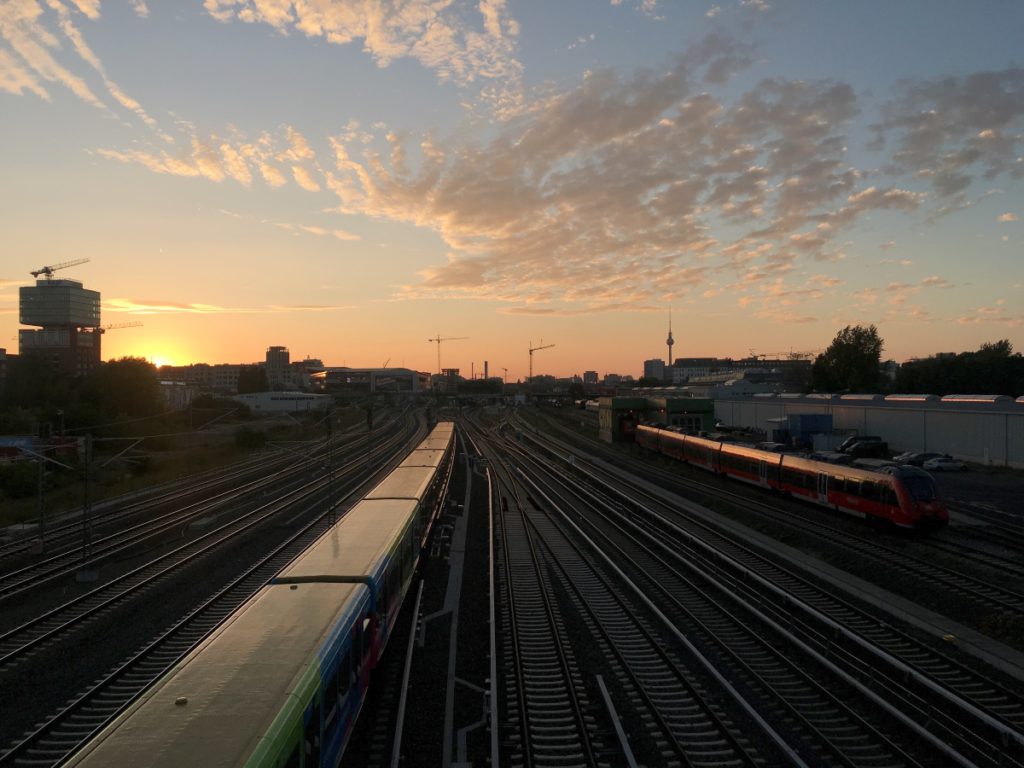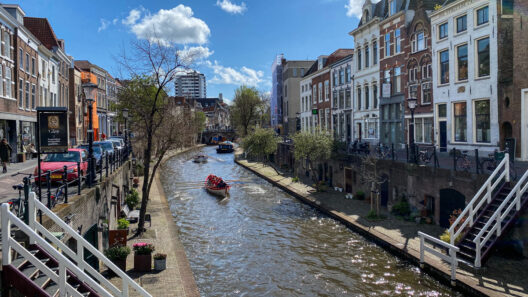Germany isn’t just an economic powerhouse and one of Europe’s largest countries – it’s also a very interesting place to live. With world-class infrastructure, lively cities, adorable villages and great beer, what more could you want?
If you’re an Australian aged between 18 and 30 years old, you can apply for a German Working Holiday visa. This lets you live in Germany for up to a year, during which time you can leave and re-enter the country as often as you like.
You may also work during your stay in Germany, although any work should be “incidental” to your holiday and not the primary reason for you travelling to Germany.
This page contains information about Germany’s Working Holiday Visa for Australian citizens, as well as living in Germany. It was last updated on 16 January 2026.
Key facts about Germany
-
Population: Approx. 84 million
-
Official language: German
-
Capital city: Berlin
-
Largest cities: Berlin, Hamburg, Munich (München), Cologne (Köln), Frankfurt, Stuttgart
-
Name of the country in German: Deutschland
-
Currency: Euro

Germany Working Holiday Visa requirements
In addition to Australians, Germany offers Working Holiday visas to citizens of Argentina, Canada, Chile, Israel, Japan, New Zealand and Uruguay. Please check the German embassy of your own country for information relevant to you.
To apply for a German Working Holiday Visa as an Australian citizen, you must meet the following requirements:
-
Aged between 18-30 years old (inclusive) at the time of application
-
Your main reason for visiting Germany is for cultural exchange
You cannot apply for this visa if:
-
You will be accompanied by dependent children during your stay in Germany
-
You have already held a German working holiday visa
Documents needed to apply for this visa
When applying for a Working Holiday Visa for Germany as an Australian citizen, you will need to provide the following documents:
-
A completed, printed and signed online application form
-
A recent passport photo (35x45cm)
-
Passport (with an expiry date at least 3 months after you complete your stay in Germany)
-
Evidence of travel/health insurance, including at least €30,000 (approx. AUD50,000) coverage for medical evacuation, repatriation of mortal remains and coverage for pandemics
-
Copy of your return flight ticket to Germany and/or proof of sufficient funds to buy one (approx. AUD2,600 for a return ticket or AUD1,700 for a one-way ticket if you already have an outbound ticket)
-
Bank statements showing proof of sufficient funds (at least AUD6,900 unless you can prove you have free accommodation for at least the first 3 months, in which case the amount is AUD2,300)
A visa fee of €75 (or AUD equivalent) applies. You can pay this at the time of application by credit card or cash.
Once your visa is processed, you can either return in person to collect your passport. Or if you provide a prepaid, self-addressed registered mail envelope at the time of your application, the Consulate General will return your passport by mail.
More information is available on the German embassy’s website. We recommend that you read the information provided by the German embassy in detail before applying for this visa.
Travel insurance requirements
You will need to make sure that your travel insurance meets the minimum criteria specified by the German embassy. Not all travel insurance policies provide adequate cover, so check the Product Disclosure Statement (PDS) carefully before purchasing travel insurance. You can also see our guide to working holiday travel insurance here.
Your travel insurance will need to be valid for your entire length of stay, and provide a minimum cover of €30,000 (approx. AUD50,000) in all of the following subcategories:
-
Medical evacuation
-
Repatriation of mortal remains
-
Coverage for pandemics
When lodging your visa application, you will need to provide the certificate of insurance and the PDS/table of benefits, which clearly show at least €30,000 (or AUD equivalent) of coverage for all of the subcategories listed above.
If your travel insurance coverage is deemed inadequate, the German authorities will not process your visa application.
How to apply for a Germany Working Holiday Visa
There are two ways that Australians can apply for a German Working Holiday Visa:
- In person at the German Consulate General in Sydney up to 3 months before your intended arrival date in Germany (strongly recommended)
- In person at an “Ausländerbehörde” (local immigration authority office) after arrival in Germany (not recommended)
Applying in Australia
The German embassy recommends applying in advance, via the Consulate General in Sydney, as this will allow you to work as soon as you arrive in Germany. You will not be allowed to work in Germany until you receive your visa.
We also strongly recommend that you apply in Australia.
You will need to make an appointment with the Consulate General well in advance of submitting your visa application. It generally takes 1-2 weeks for your visa to be processed and your passport to be returned to you.
Ensure you have all required documents with you when applying for your visa. The Consulate General will not accept incomplete visa applications – even if you flew all the way from Perth to apply in Sydney for your visa!
If your visa application is not accepted, you will need to make a new appointment to apply for a second time. The next available appointment could be weeks away.
Applying in Germany
It is technically possible to apply for this visa in Germany, but many Australians have reported difficulties with getting appointments and contacting the relevant departments on arrival. You’d also need to show proof of permanent accommodation in Germany – which would be difficult to obtain before you actually have a visa.
To save yourself a lot of stress, we strongly recommend that you do not try to apply for this visa after arrival in Germany.
If you do want to apply for your working holiday visa after arriving in Germany, you’ll need to ensure you’ve received your visa within 90 days of arrival.
If you apply in Berlin, your visa could be processed on the same day. But in the wurst-case scenario (pardon the pun!), it could take 4-6 weeks to process your visa.

Arriving in Germany
You will need to deal with a little bit of German bureaucracy after you arrive. That may seem like a scary prospect, but it’s not as bad as it may sound!
Once you have a new address in Germany, you must register with the local municipal government (this procedure is known as the “Anmeldung”). This generally needs to be completed within 7 days. However, in some states (e.g. Berlin) it’s 14 days and in others (e.g. Rheinland-Pfalz) it’s immediately. You will also need to register if you change address, and de-register when you leave Germany.
To complete your Anmeldung, you’ll need to fill out a form (this will probably be in German) and visit your local government office with proof of identity. Check the requirements for your state as these may vary.
Once you’ve registered, you will receive two important documents which you will need to get a job or access services in Germany (e.g. opening a bank account):
-
Anmeldebestätigung/Meldebescheinigung (certificate of registration confirmation)
-
Steueridenitifikationsnummer (tax ID number)
The German embassy also advises that you should make an appointment with the Ausländerbehörde (foreigners authority) shortly after arrival.
If you decide to work in Germany, you may need other documents down the track and you’ll probably need to get a local health insurance policy. But the main thing is to complete the Anmeldung as soon as possible.
Once you’ve registered, unfortunately you’ll probably have to pay Germany’s infamous TV & radio tax. The cost is €18.36/month per household. Pretty much everyone has to pay this – even households without a TV or radio!
Germany also has a “church tax”, but you would only need to pay this if you declare a religion when registering in Germany. Leave this field blank to avoid paying this income tax!
Living in Germany as an Australian
Berlin is probably the most popular place to live in Germany for young people and internationals. There’s good reason for this – it’s so much more than the capital and largest city! It’s a multicultural metropolis which also has lots of nature, open spaces, a fascinating history, excellent culture and nightlife, and so much to see & do.

Germany is a large country and there are differences between the various regions, including cultural and language/accent differences. The “German food” most people associate with the country is actually Bavarian food; you’ll find all sorts of different cuisines in the north of the country.
Living in Germany is generally affordable. But wealthy cities like Munich, Hamburg or Frankfurt may be more expensive to live than places like Berlin, Leipzig or Dresden.
Germany is well-connected by high-speed trains, and there are large international airports in Frankfurt, Munich, Dusseldorf, Hamburg, Cologne and Berlin. (Frankfurt and Munich are by far the two largest airports as Lufthansa has bases there.) In any city in Germany, you should have no problem getting around by public transport or even bicycle.

English is widely spoken in large cities like Berlin, Frankfurt and Munich, but is less common in smaller towns and among older people. At least a basic knowledge of the German language will make life much easier for you when living in Germany.
Germany’s bilateral visa exemption for Australian citizens
By the way, Australia and Germany do also have a bilateral agreement that allows Australians to stay up to 90 days at any one time in the country without a visa. Under this agreement, there is no limit to the number of times Australians may re-enter Germany.
However, the bilateral agreement does not come with the right to work in Germany and you would need to travel to a non-Schengen country at least once every 90 days to reset the clock. So, a working holiday visa could still be a better option if you want to live and work in Germany as an Australian citizen for up to a year.
While best efforts are made to keep this information updated, we do not guarantee its accuracy. If you spot an error, would like to suggest new information to be added or simply have a question, please let us know in the comments. We’ll endeavour to respond or update the article as quickly as possible!
Matt is the founder of Working Holidays for Aussies. Passionate about travel and always looking for great deals, he believes that a gap year is the perfect opportunity to immerse yourself in another culture and learn all the things they didn’t teach you in school!
Originally from Australia, Matt has travelled to over 100 countries, lived in 7 countries, and has extensive real-world experience with working holiday visas.













Hey,
Your summary is great. Just confused with the funds part, I read somewhere you need to provide evidence for 3 months of the funds. At the appointment in Sydney would haveing AUD7,100 in my bank be okay or would i need to bring bank statments with me proving that amount has been in my account for the last 3 months?
Hi Alistair, the requirement is that you need to prove you have had at least AUD7,100 in your bank account for at least the last 3 months. In other words, you need to show bank statements that date back 3 months, and show that you had at least AUD7,100 in your account during that entire period.
Hi Matt, thanks for all this great info. I’m in Germany already and am happy to apply at any office for a working holiday permit. The residence registration confuses me though… Are we supposed to show a rental agreement for a one year lease? That’s totally impractical to get before even having a visa. For the working holiday permit appointment at the office in Germany, would a “here’s two months booked in an airbnb” situation work? Or do they expect a lease that covers the entire duration of the working holiday?
Hi Morgan,
Unfortunately I can’t give you definitive answers to these questions, but if you need an Anmeldung (residence registration) in order to apply for the visa from within Germany, you would need to be living somewhere where you are able to register. You probably wouldn’t be able to do this at an Airbnb where you are staying temporarily.
This is one of the several reasons why we no longer recommend that people try to apply for this visa while in Germany, even though it’s technically allowed.
Perhaps you could try to apply and see what happens, but applying from Sydney is (unfortunately for you) much easier.
Thanks for the great summary.
I’m trying to figure out the technicalities around the proof of sufficient funds and the flight tickets.
If I haven’t booked my flights yet, is the cost of the flights in addition to the proof of sufficient funds or within the $7100 AUD?
Hi Taylin, the proof of sufficient funds is in addition to the flights. So, if you haven’t yet booked a return ticket to Germany (and don’t have free accommodation for the first 3 months), you would need to show that you have at least $7,100 + $2,100 for a return ticket in your bank account. In other words, AUD9,200 in total.
Hi, thank you so much for all this great information. I’ve been offered a 3-month artist residency in Germany – I’d most likely rely on my savings and probably not work while I’m there, although there may be an opportunity to sell artwork through the art studio. I’m really unsure about which visa I’d need, if any?
If I wanted to stay on a bit longer than the 3 months, would I be better off getting a Working Holiday Visa before I leave, or applying for one (or another type of visa) while I’m there?
Thank you
I can’t really advise you on this, but perhaps have a look at the German government’s visa navigator: https://digital.diplo.de/navigator/en/visa#/vib
This may also be of interest: https://digital.diplo.de/navigator/en/visa/overview/liberal-professions
We don’t really recommend applying for a working holiday visa after arriving in Germany. If you wish to apply for any type of visa, it’s best to do this before you travel.
Thanks so much for your quick reply.
Hi Matt,
There’s no “not applicable” tab in the online application form of the reference section…
Is there another way around this?
Ah, I see. I think you could just need to enter the name/details of a person who can vouch for you (like you would on a job application). They don’t necessarily need to be in Germany.
However, the German embassy website still states: “NOTE: You do not have to give a reference person in the application form, instead you can enter “not applicable”.”
Would staying in a hostel count as proof of accomodation for that requirement?
I believe you’re talking about the proof of funds requirement? (As per https://australien.diplo.de/au-en/service/visa/long-term/working-holiday/2640582)
I don’t think a hostel booking would allow you to reduce the amount of funds you need to prove that you have available, because the German government refers to proof of “free accommodation” here (e.g. with friends).
Do I need a return ticket from Australia to Germany when I apply at the consulate? Or is a one-way (Australia to Germany) ticket fine for the application?
Also is a reference absolutely essential for the application?
You need either a return ticket, or proof of sufficient funds to buy one.
I don’t believe a reference is a requirement for this visa.
Please have a read of https://australien.diplo.de/au-en/service/visa/long-term/working-holiday/2640582
that’s fair, thank you
Hi Matt, do you have any tips for registering an ameldung (and the Netherlands equivalent) when traveling with no fixed address?
Hi Jacinta, I don’t believe it is possible to register without a fixed address as the whole point of an Anmeldung is to register your address.
If you need an Anmeldung for other reasons, maybe you could see if you could use a friend’s address where you are staying – although in the case of the Netherlands, this may cause issues for your friend if you’re not planning to stay there and some addresses only allow a limited number of people to register there. You may also need to show a rental/stay agreement.
In other words, unfortunately the system in these countries is not set up for this.
Hi Matt,
If I apply for this VISA, does the time i spend in Germany count towards time allowed to spent in other Schengan countries. For example if I spend my first 90 days in Germany on this VISA, does this now mean that I have to wait another 90 days out of the Schengan area to then travel other Schengan countries? Or is Germany now an exception to the Schengan area stay allowance since I’m on a work-holiday VISA there?
Cheers,
Callum
If you have a working holiday visa for Germany, you are allowed to travel to other Schengen countries while your visa remains valid. However, you’re just supposed to spend the majority of your time in Europe in Germany and are not allowed to live or work in other Schengen countries.
Hi Matt
My son has been in Berlin on a working holiday visa that expires in 3 weeks. He has been given a job in the travel industry in the last month with a contract. How easily can he move to a working visa. He has been considering moving to a student visa to stay and study German but it’s an amazing job opportunity.
What would he need to apply for the working visa, he’s been trying for months to get an appointment to move to a student visa but now this job has come up .
Any advice would be appreciated.
Hi Rhonda, I’m afraid we only cover working holiday visas and I can’t give you personal advice on this. But in general, I’d suggest that his new employer could sponsor him for a work visa. If his new employer has offered him a contract then they should be able/willing to do this.
Hi Im planning on living and working in berlin and am wondering what information you had around living there with diabetes?
Hi Matt. Thanks again for pulling all this info together!
Do you have to arrive to Germany within 3 months of getting your visa/on your intended date of arrival?
We want to apply for a visa but are unsure of our travel plans beforehand so we may not be able to make it to Germany on the intended arrival date.
Thanks for your help.
You might want to check with the German consulate when applying for your visa on this one. As far as I’m aware, there’s no specific rule that you must arrive on your intended arrival date/visa start date. However, you need to show a flight booking into Germany when applying for the visa and that will be the start date used.
Hey Matt,
I am an Australian citizen living in germany on a work and travel visa, I arrived recently. I am unsure about how many hours I am allowed to work per week/month. on some websites it says I’m allowed to work without a residency permit and on others it says the oppisite and I can’t find any information about working hours regarding my visa for work and travel for a year from Australia to germany. do I need to apply for a residency permit to work or can I work with the visa I have straight away? and if so am I allowed to work full-time? or is their a certain amount of hours I’m allowed to work with or without the verification of residency?.
hope this message finds you well
kind regards, John Sadler
Hi John, if you have a working holiday visa issued by Germany in your Australian passport, then you are allowed to work in Germany while your visa remains valid. That visa is effectively your residence permit. (You may still need to get some other documents as required by your employer, e.g. a tax identification number/Steuridentifikationsnummer.)
I believe you are allowed to work full-time, but this visa is not intended for you to work full-time for the same employer for the entire year. It’s supposed to let you do “incidental” work to help fund your holiday. That said, I don’t think there are any specific limits currently. (At one stage, I think there may have been a limit of six months of work per employer.)
Hi Matt, would it still okay if you flew into another european country, say Italy and then travelled up to Germany say by train?
Yes, that should be fine Blake. I actually flew into Paris and then took a train to Germany when I applied for my German working holiday visa some years ago.
Just submit both your plane ticket to Italy and your train ticket from Italy to Germany with your visa application.
Hi Matt,
I had a questions regarding the 90 out of 180 days for staying in the Schengen area. Hypothetically, if we both are residing in Germany on working holiday visas, once 90 days have passed since our arrival are we still eligible to travel to other Schengen countries as we have permits to reside in Germany? Or does this initial 90 days, even though we will be valid visa holders, count as our 90 out of 180 days period?
Thanks in advance!
While your German working holiday visa remains valid, you can travel in other European countries for up to 90 out of every 180 days (with time spent in Germany not counting towards this).
This is stated by the German government here: https://australien.diplo.de/au-en/service/01-visa/working-holiday/2596268
However, you would need to leave the Schengen Area before your German visa expires.
Hi Matt,
Thank you for this useful article.
I’m an Australian, 30 and currently have a remote job. I am planning to spend more than 3 months in Germany so thinking of applying for Holiday working visa. I can continue my current job remotely and I don’t really have to look for an employment elsewhere when I am in Germany as it’s a well paying job.
Do you think I would run into any problems if I continue my remote job on this visa? OR do you have any other visa suggestions for remote workers?
Thanks!
Hi Ron, I think your plan sounds fine but I can’t give you solid advice on this, sorry. It’s a bit of a grey area. Certainly, the working holiday visa does allow you to stay for more than 3 months (a year in total) and work in the country, so you should have no problems there. I would suggest talking to an accountant though about any possible tax implications if you were to become a tax resident of Germany. (There is at least a double tax agreement between Australia and Germany).
Hi Matt, it appears that there is a six month limit of working for a single employer
Would it be legal to work six months with one business and a further six months as a freelancer?
Is the six month rule strictly enforced?
Ideally I would want one year with a single employer… I’m Australian, professional graduate, age 25…
Perhaps changing visa after six months would be the best option…
great page by the way. very helpful!
Interestingly, the Federal Foreign Office website no longer specifies the six-month limit per employer. I’m not sure if that is the result of a change in policy or just a new webpage – https://australien.diplo.de/au-en/service/01-visa/working-holiday/2596268
You would need to check with the German authorities regarding the answer to that question. But I would note that there is a separate freelancer visa (https://australien.diplo.de/au-en/service/01-visa/working-in-germany/2073676#content_3).
Hi Matt,
For the work holiday visa for Germany.
Do you understand that the medical insurance is for at least 30,000 euros and must include repatriation /evacuation and repatriation of human remains.
I can find unlimited medical but the repatriation is limited to 25,000 euros
This seems to cover the requirements or is it 30,000 euros for medical, 30,000 for repatriation and 30,000 for repatriation on death?
Just hoping to find clarification here.
Thank-you
Hi Madeline, the €30,000 requirement is for all of those things individually – including repatriation costs. You may need to find a different policy which includes more coverage for repatriation costs, as not having this would be grounds for your visa to be refused.
Please read this guide for more details: https://workingholiday.au/travel-insurance/
What insurers would you recommend for a 1-2year trip combining general holiday a working holidays?
Sorry Jacinta for the slow reply.
Please see here for travel insurance recommendations: https://workingholiday.au/travel-insurance/
Hi Matt,
I’ve got my appointment at the consulate in sydney next week, however ive hit a snag in finding travel insurance that fulfils the requirement of covering pandemics/epidemics, are you able to reccomend a provider that the consulate will accept?
Did you end up finding insurance that the consulate will accept? Having the same problem with finding coverage for pandemics and my appointment is next week.
Response would be greatly appreciated.
Thanks.
Hello 🙂 I am on a working holiday 1 year visa in Berlin at the moment and one of the conditions are that I have to change jobs every 6 months. However I am at a job I really like and the 6 month mark is approaching, do you know about being able to extend working at that job? Is there a letter I can get from the employer? My visa won’t run out for another 4 months but I want to stay there. I have tried researching online but couldn’t find anything about it. Any information would be greatly appreciated
Hi Lindsay. Glad you’re enjoying your time in Berlin 🙂
If the rule is that you can only work for up to six months with the same employer, then I don’t imagine the German government is going to give any flexibility with that. In Deutschland, Regeln sind Regeln 😉
So, while I don’t think you would have much luck continuing beyond six months on your working holiday visa, perhaps you could look into the possibility of your current employer sponsoring you for a different type of visa (i.e. a work visa)?
I would definitely recommend applying for the visa before arriving in Germany. I made the mistake of waiting until I arrived because I wanted to travel first and be able to utilise as much of the yearlong working holiday visa as possible after finishing my travels. It is very difficult to get hold of the correct authority. In Bremen the wait time just to get a call back from the correct department of the Ausländerbehörde is 1-2 weeks, this is before even booking an appointment.
I agree – I will update the guide to make it clear that it’s best to apply for the visa before arriving in Germany.
I also want to share my experience, even more recently (mid August 2023), my partner and I applied in Berlin on arrival as a Plan B (Plan A was Netherlands but had spent 3 months trying and failing to find a place to live but got viewings in Berlin easily). The whole system in Germany is paper based, you can’t get any clear answers (we went to an immigration office and ask some Qs at a desk which we realised later was just security staff so idk why they answered our Qs) and more importantly you need an apartment/somewhere to live long term where you can register BEFORE you can even apply for the visa. Why you would sign a contract without a visa I will never understand. Anyway, we submitted applications stating we had an appointment for the Anmeldung (the housing registration requirement) and have never heard back from the immigration office. This was 2 months ago. My friend living there thinks the whole immigration department is overwhelmed/paused and just focusing on managing refugees at the moment, nobody is hearing back from them.
Thankfully we arrived in The Netherlands, got a WHV within a week (NL has the best bureaucracy in the world in my opinion), and eventually a room in a house!
Sorry I accidentally went on a massive rant there! :’) My main intention was to advise against applying on arrival as it may end up very stressful with lots of unknowns.
Hi Matt, I am desperately looking for advice in what is proving to be a very confusing process. My 22 year old daughter arrived in Germany 2 weeks ago with the intention of just applying for the working holiday visa in Berlin. She ended up sick on arrival and spent the first week in bed, the second week in hospital. She’s now out and needs to work through the process. My understanding is that in order to apply for a working holiday visa, you need a residence permit first. And in order to get this, you need to prove that you have a place to live (she will be living with a friends parents in their house). It’s also my understanding that all of this needs to happen within the first 14 days (which is tomorrow). However, there are no appointments at the local office that gives the residence permit. Additional to this, there does not seem to be any appointments available at all at the office that does the working visa. So that’s two appointments she must get asap, and she can not even secure a date. Is this really the case? I also read something else somewhere that was conflicting but I’m not sure if it’s true, if her friends parents fill in a certain residence form proving she is living there, then she doesn’t need the appointment right now for the residence permit in order to get the visa. Is this true? As you can see, it’s all so confusing. Any advice would be greatly appreciated. Thank you!
Sorry to hear about all of these troubles. I’m not sure if this is still the case, but when I was in Germany, you could apply for the Anmeldung and a working holiday visa by simply turning up in the morning at the relevant offices and waiting in the (long) queue. This may have changed now.
I’m not sure about the possibility for her friends’ parents to fill in a registration form for her – they would know more about this.
I understand that it’s not at all ideal and may not be practical for your daughter, but my honest opinion is that it might be easier for her to return to Australia at this point, apply for a visa in Australia, and then return to Germany once she has the visa.
I’ve heard a few stories about similar difficulties with applying for this visa on arrival, so will update the guide to emphasise that it’s best to do it in advance.
Hi, I can see that you need to have travel/expat insurance to apply for the working VISA. Do you need to prove that you have insurance paid for the whole year? Or can you show that you are paying on a month to month basis?
Thank you!
Your travel insurance needs to be pre-paid and valid for the entire duration you plan to stay in Germany. If you plan to stay for a full 12 months, your travel insurance needs to be valid at least that long.
Hi Matt,
I am currently in the process of attaining a WHV for Germany. My intentions are to spend the first while of my trip travelling the many places of Europe and then the rest of my time living and working in Berlin.
Is the Anmeldung process required upon my arrival to Germany even if i am not living and working right away?
As far as I’m aware, the Anmeldung is required once you have moved into a regular place of residence in Germany.
Hi Matt, Thank you for providing all of this information. I understand there is a maximum 6 month employment with one employer, however is there any such restriction on hours per week that can be worked?
I am also interested in if there are any other visas for working in germany, that are longer than one year however not having a qualification? I am studying online at an australian university, however will not finish this study until 2 years into my stay in Germany – therefore I plan to stay multiple years but work ‘unskilled’ jobs until graduated. Thank you in advance 🙂
There’s no restriction on number of hours worked as far as I’m aware.
Regarding other types of visas, this is not something we cover on this website sorry.
Thanks so much for your blog. I am confused by this requirement for the German working holiday visa. Could you explain this a little more? It appears to only apply to people with dependent children?
You cannot apply for this visa if:
You will not be accompanied by dependent children during your stay in Germany
The official wording from the German government states that you must “not be accompanied by dependent family members (e.g. children) during your stay”.
Basically, this means that this visa does not entitle you to bring any children with you to Germany under the same visa. If you happen to have a child/ren but they won’t be coming with you to Germany at all, then there shouldn’t be a problem.
Hello,
Can I apply for the via at an Ausländerbehörde that is not in Berlin? Do you happen to know if there is one in Munich?
Thank you in advance!
Please see my answers to the previous questions which asked about this.
You should be able to apply in Munich but I have not personally tried this.
Hello,
Im hoping to apply for the WHV once In Berlin, does this mean I will need to find somewhere to live and register with the Anmeldung first before applying? or do they accept / approve applications if I’m staying somewhere temporary (hostel, hotel etc) until finding accommodation and work
Thanks for your help!
Maddi, have a look at this page: https://service.berlin.de/dienstleistung/305265/standort/121885/en/
One of the required documents when applying for a working holiday visa in Berlin is “proof of main residence in Berlin”. This can be either in the form of a “Certificate of registration at the main residence” (i.e. the Anmeldung/Meldebestätigung) or a “Rental agreement and written confirmation of occupancy from the landlord”. The website I’ve linked above has an example of a rental agreement that would be accepted.
Hello all,
Just a question regarding applying for the working holiday visa in Germany.
I’m currently living with my girlfriend in Hanau and in the process of anmeldung here. Firstly, will I need to travel to Berlin to to apply for the working holiday visa or can these be also completed at the Australian Consulate in Frankfurt?
You shouldn’t necessarily need to travel to Berlin, but you definitely can’t apply for a German working holiday visa at an Australian consulate. The Australian government doesn’t issue these visas – the German government does.
As per my response to the previous question (see above), you should be able to apply at any Ausländerbehörde (immigration office) in Germany.
Hi, my daughter (Australian) is hoping to obtain a working holiday visa AFTER she arrives in Germany, as she currently lives in the USA so can’t apply in Australia beforehand.
It is a little confusing as one website seems to imply that you MUST register to live and apply in Berlin. However your information here sounds as though she would be able to apply elsewhere at the local immigration authority in her region. (In her case somewhere near Lorrach would be ideal.) IS this correct? Would that mean she still has to post her passport to Berlin??
Does her insurance have to cover one year after the date of her visa appointment?
Thank you for any clarity you can bring !
I don’t have any first-hand experience with applying in Germany, but according to the German government website you should be able to apply at any Ausländerbehörde (immigration office) in Germany. There is one at Lörrach – https://www.loerrach.de/de/Stadt-Buerger/Rathaus-Buergerservice/Ihre-Ansprechpartner/Fachbereiche/Aufgabenbereich?view=publish&item=level1&id=26
It is possible that applying in Lörrach could be slightly more complicated because they probably would not have processed many of these types of visas there before, but I don’t see any reason why it wouldn’t be possible or why she would need to post her passport to Berlin.
The travel insurance would need to meet the requirements for the visa (minimum coverage for certain things) and be valid for her entire stay in Germany.
Hi, thanks so much for this article, was a great read 🙂 Do you know if we can change a working holiday visa to a work permit/visa if we secure a more permanent job? Thanks, Emily
Hi Emily. You wouldn’t be able to “change” your visa type, but if you wanted to secure a more permanent job in Germany down the track and had a sponsor etc., there’s no reason you couldn’t later apply for a different type of visa that you are eligible for.
This page contains general information about other types of working visas in Germany: https://australien.diplo.de/au-en/service/visa/long-term
Hi,
I am currently filling out the Videx long-term visa application form to get the Working Holiday Visa. In the section “Reference”, what is it asking for? I don’t have a company/organisation sponsoring me. Do I put “Reference person”, and if so must this be someone I know in Germany? Or can it be a relative here in Australia, or even a hotel I’m planning to stay in in Germany?
Would so appreciate the help of someone who’s gone through this process before! My appointment is very soon!
Thanks,
Finn
I’m not exactly sure as this was not a requirement back when I applied, but if you’re applying for a working holiday visa I would suggest that listing the details of a “Reference person” would be most appropriate. I assume this could just be a relative or friend who can vouch for you, and that they don’t need to be in Germany as the drop-down box lets you choose any country when entering their address.
Hi, I am looking at applying for the youth mobility working visa and intend on working in Germany sometime this year. In just over a month I will be over my 90 days within 180 days in the Schengen area and I was wondering, given I am able to obtain this youth mobility visa, if I am allowed to travel to the other Schengen countries once those 90 days are up? For reference, I have a place to live in Germany. Thank you for your help
No, I believe the limit of 90 days out of every 180 days would still apply to other Schengen Area countries other than Germany. This is a visa specific to Germany and only gives you the right to live, work and stay in Germany beyond the usual 90/180 days in Schengen countries.
Please see: https://workingholiday.au/europe-working-holiday-visa/
Hi Matt – thanks for this it is very helpful. Are there any restrictions on earnings or the types of positions you can take? I understand you can only work for the same employer for 6 months, but are there any other restrictions? I recently arrived in Berlin and was hoping to find work in the film industry. Thanks!
I’m not aware of any such restrictions on the type of work that can be carried out. The German Foreign Office website states: “To help finance the stay, jobs can be taken up with different employers of the visa holder’s choice.”
https://australien.diplo.de/au-en/service/01-visa/working-in-germany/2073676#content_7
Good Evening !! My daughter interest to live in Germany at the end of this year . I just wondering With Work Holiday Visa !! I am be able to studying .. attend class for germany language as well ?
I believe it would be fine to take a short course, such as a German language course. If she would study for a longer period, a student visa might be more appropriate.
Hi, I want to travel to Europe for tourism purposes but stay there for around 5 to 6 months. Reading above, it seems that I will need to have a place of residency but I don’t intend to live in Germany. Do I then need to still have a place?
The German working holiday visa only gives you the right to stay in *Germany* beyond the 90 out of every 180 days you are allowed to stay the Schengen Area as a tourist. A German visa doesn’t necessarily give you the right to reside/stay in other European countries for more than 90 days. So, if you don’t intend to live in Germany, this is probably not a suitable visa for you.
Does a German Working Holiday Visa allow me to work in other EU countries?
No, it doesn’t.
Have a read of https://workingholiday.au/europe-working-holiday-visa/
Hi there, I am travelling into Germany at the beginning of June and need to apply for a working-holiday visa. I’m just wondering where I can apply for one and what I need to apply for it? I have all my legal documents and insurance ect just wondering if there is anything else?
Have a read of the article above and the links to the German government websites which contain the info you need.
Hi Matt,
could you reccomend a travel insurer that satisfied the requirement for “pandemic” coverage, all of the australian ones ive looked at seem to include all pandemics except covid19 in their general exclusions. Thanks!
Did you end up finding insurance that the consulate will accept? Having the same problem with finding coverage for pandemics and my appointment is next week.
Response would be greatly appreciated.
Thanks.
Reply
Hi,
I would like to secure a job before going to work in germany any recommendations on websites that are legit in which I can search for jobs.
Thank you
I’m not sure that I would recommend trying to find a job before you arrive in Germany. It would be quite difficult to do so, particularly for the types of jobs you would normally work with a working holiday visa (keep in mind the maximum employment during is six months per employer), and most employers would want to at least interview you in person and check that you can legally work in Germany before offering a job.
Regarding websites – Xing, StepStone and Indeed are all legit, but there are many others. Many jobs are advertised directly by the employer and/or in-store (for retail/restaurant work).
One tip when applying for a job in Germany – note that it’s customary to include a photo of yourself on your resume.
Hi, my partner would like to apply for a working holiday visa on arrival. How long does it usually takes to get approved? As one of our friends applied for one on arrival and got it straight away, however on your website it states 4-6 weeks. Any idea why? Is it different for each state?
Regards,
Annie
I have heard mixed reports about this. One website (https://www.nomadenberlin.com/german-working-holiday-visa) says it normally takes 4-6 weeks, but the official Berlin government website (https://service.berlin.de/dienstleistung/305265/standort/121885/en/) says the residence permit is normally issued on the same day.
I have personally spoken to other Australians who’ve had their working holiday visa processed at the immigration office in Berlin on the spot, so if this is also the recent experience of your friend, I think that is the most likely scenario if you are applying in Berlin. 🙂
The processing times could be different in other cities.
I’ll update this page with this info.
Hello, Your website is very helpful. I am having trouble confirming online that the German government currently allow Australians to apply for a working holiday visa after arrival in Germany. My son doesn’t have time to apply before leaving Australia, so we would like to confirm it is still possible to get the visa after he arrives. Perhaps you can suggest a current web page? Thanks so much!
Hi Heather! Have a look at: https://australien.diplo.de/au-en/service/01-visa/working-in-germany/2073676#content_7
In particular, this page contains the following information:
“Australian citizens (as well as New Zealand, Israeli and Japanese citizens) are able to apply for a residence permit after entering Germany at the local immigration authority (‘Ausländerbehörde’) without applying prior for the visa in Australia. But, we recommend to apply for the Working Holiday Visa in advance, because the visa issued is valid for the whole first year and it allows you to start working immediately after arrival.”
Hi. I would be keen to live and work in Germany, however I want to study. Any advice?
If you would like to study in Germany, a student visa (“Studentenvisum”) may be more appropriate. See https://www.auswaertiges-amt.de/en/visa-service/buergerservice/faq/-/606850